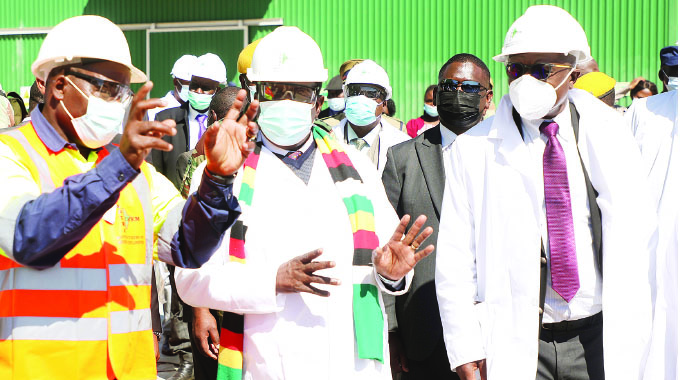Tax-free threshold doubled, bonus windfall for workers

Oliver Kazunga Senior Business Reporter
The tax-free threshold for income tax was doubled to $50 000 a month yesterday by Finance and Economic Development Minister Mthuli Ncube as part of the doubling of all tax bands to improve disposable income for the workers.
Presenting the 2022 mid-term budget and economic review and a supplementary budget to cope with inflation seen this year, Prof Ncube told Parliament that the adjustment to wages and salaries was in response to the prevailing inflationary pressures and exchange rate volatility.
Prof Ncube also looked at the end of year bonuses and increased the tax-free setting for bonuses fivefold to $500 000 with effect from November 1. His record has been to ensure that almost all skilled workers and below get their full bonus.
The doubling of the width of the tax brackets from the zero rate to the 35 percent rate, mean that people only start paying the maximum rate of 40 percent tax on their pay over $1 million a month. These new tax rates come into effect next month.
The rates for the first seven months with the zero rate for the first $25 000 and the top rate on earnings over $500 000 were part of the last budget and came into effect at the beginning of the year.
“Adjustments to wages and salaries in response to macroeconomic developments have resulted in bracket creep on local currency denominated remuneration. This measure is envisaged to increase disposable income, spur consumption spending and income for corporates,”
Prof Ncube said the Government remained committed to addressing the welfare of civil servants in a fiscally sustainable manner.
In this context, he said the challenges of yesteryear when the wage bill crowded out other development expenditures should be avoided in order to create the right conditions for sustainable economic growth.
The Treasury believes this would provide scope for payment of decent salaries to the civil servants while the Government was also stepping up provision of non-monetary incentives to improve the civil service welfare.
The supplementary budget in effect doubles spending this year. In the extra spending for which approval is now sought, the percentage of the additional funds going on compensation has risen to 53 percent, significantly higher than what was the case in the original budget.
Putting the original and new budgets together gives civil service compensation close on 44 percent of Government spending for this year, higher than what was originally intended. The new percentage suggests that the Treasury is pushing civil service pay as hard as it can without damaging the major Government development programmes.
This was the first supplementary budget presented by Prof Ncube. He is seeking the required permission from Parliament to raise spending by $968 billion, almost double the original estimates, to cover rising costs resulting from high inflation.
But he also explained that almost all this extra spending would be covered by rising revenues from taxation, since inflation increases those as well. It was the inflation during the first half of 2022, characterised by increasing revenues and expenditure pressures, that meant the Government needed to come up with an extra budget to meet Constitutional requirements.
So far Prof Ncube has refused to borrow except in very limited circumstances for a small minority of capital
spending and even then only when there is an immediate additional stream of revenue resulting from this that can be used to service the lending.
Prof Ncube also revised the projected GDP growth for this year down to 4,6 percent, from 5,5 percent originally projected on the back of global pressures. This is still well above projections for both global and African growth.
Besides maintaining fiscal discipline and maintaining something very close to a totally balanced budget with revenues and spending almost identical, Prof Ncube said other economic fundamentals were also sound.
Exports in the first six months rose 33 percent while imports rose just 15 percent, minimising the modest trade deficit. However when total foreign currency inflows, which include diaspora remittances and other payments, are totalled then Zimbabwe receives more foreign currency than it spends.
In other tax measures introduced in his supplementary budget, Prof Ncube scrapped duty on scientific equipment and wants to increase the royalty paid by platinum miners to 5 percent from next year, saying this was in line with the general African level. He also wants the same royalty on lithium mining.
Looking at the general economic situation Prof Ncube noted that exchange rate volatility and inflationary pressures were largely being triggered by financial market distortions induced by parallel market activities, internal dynamics and other factors induced by the conflict in Ukraine because Russia and Ukraine are huge global suppliers of grains and oil seed, and Russia a major exporter of fuels.
The conflict has seen supplies fall while demand remains constant.
He did see inflation falling though.
The Consumer Council of Zimbabwe regional manager for Bulawayo Mr Comfort Muchekeza said increasing disposable income was a step in the right direction.
“But as consumers, we would want the budget if it can take into account issues of capacity utilisation in the productive sectors and the revival of industries,” he said.
Some of the ordinary people who spoke after the presentation of the budget applauded the efforts by the Government in trying to improve disposable income by raising the tax free threshold.
Besides giving the supplementary budget and the mid-year review, constitutional and legal obligations, Prof Ncube also looked ahead in the initial budget strategy paper for next year released with his review for this year.
This is the first indication of where the pressures are likely to be and should help build up debate to his main budget for next year that will be presented near the end of the year and be based on firmer projections.
He still sees strong economic growth continuing into next year, and in fact picking up to 5 percent from the revised 4,6 percent for this year.
But some of that projection depends on stronger mineral prices, a reasonable agricultural season and better global growth. Looking at the worst case he said that if domestic and external risks did materialise then his growth projection could be knocked down by 2 percent to 3 percent.
Examples of the sort of problems that Zimbabwe could face arise from the global situation.
“For every 1 percent increase in global food prices, the pass-through effect into the domestic inflation, ranges from 0,1 percent to 0,6 percent depending on the local food supply situation,” said Prof Ncube.
Climate change would negatively impact agricultural output, and so the Government needed to implement programmes meant to build resilience of the economy. This requires continued capital spending.
Inflation can also reduce the real value of taxes as people and businesses delay payment of tax. While if taxes are paid promptly the rising nominal amounts matches inflation, if taxes are late then it is calculated that for every 1 percent increase in inflation the value of the taxes falls 0,05 percent.
In addition, the rising infrastructure costs due to global inflation may push the cost up and this may require existing contracts to be re-evaluated or re-negotiated.
“The proposed strategies and priorities for 2023 will need to take into account, the prevailing global and domestic economic environment, risks to the outlook and the attendant emerging issues such as the 2023 electoral processes,” said Prof Ncube.









Comments